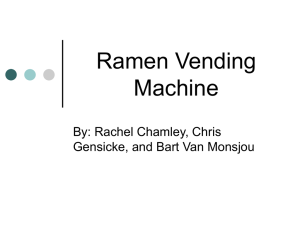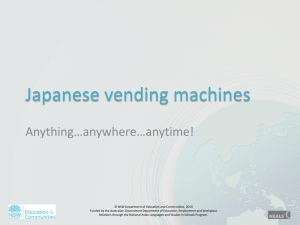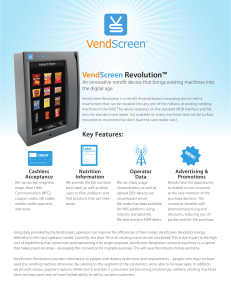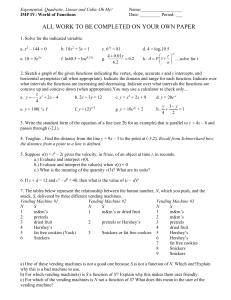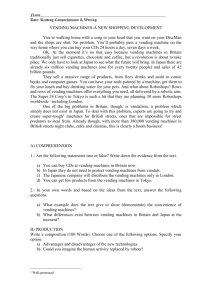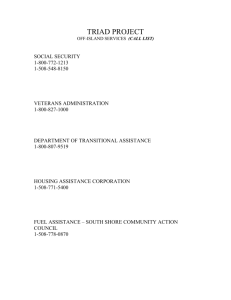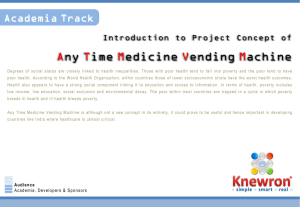The Do's and Don'ts of Challenging a Federal Entity
advertisement
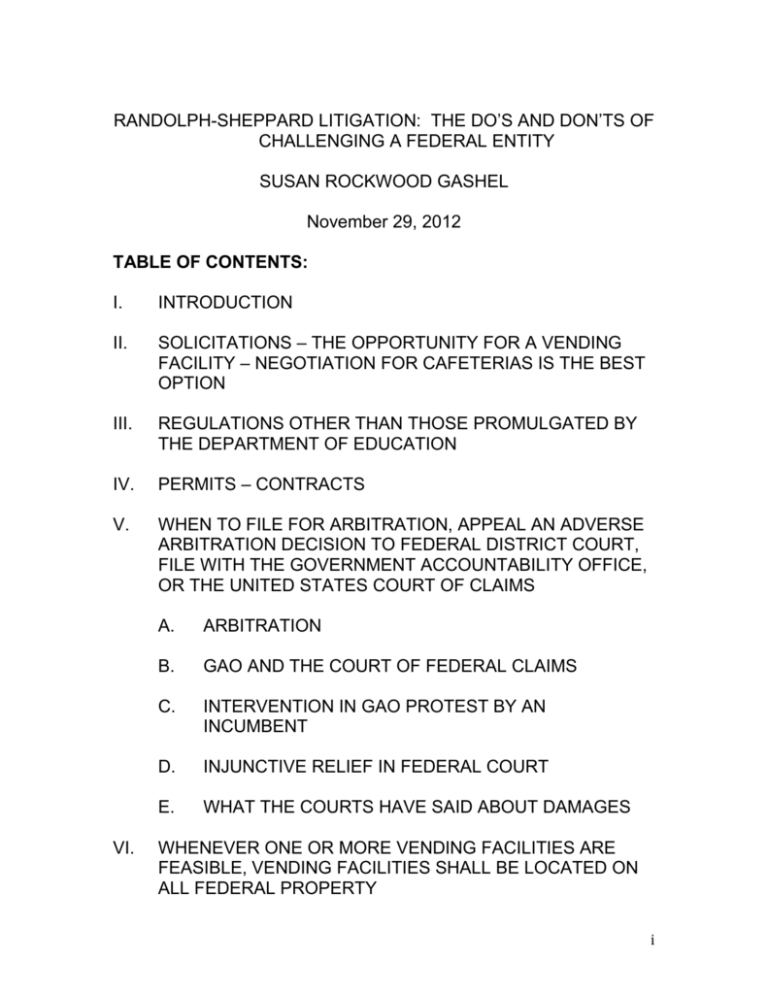
RANDOLPH-SHEPPARD LITIGATION: THE DO’S AND DON’TS OF CHALLENGING A FEDERAL ENTITY SUSAN ROCKWOOD GASHEL November 29, 2012 TABLE OF CONTENTS: I. INTRODUCTION II. SOLICITATIONS – THE OPPORTUNITY FOR A VENDING FACILITY – NEGOTIATION FOR CAFETERIAS IS THE BEST OPTION III. REGULATIONS OTHER THAN THOSE PROMULGATED BY THE DEPARTMENT OF EDUCATION IV. PERMITS – CONTRACTS V. WHEN TO FILE FOR ARBITRATION, APPEAL AN ADVERSE ARBITRATION DECISION TO FEDERAL DISTRICT COURT, FILE WITH THE GOVERNMENT ACCOUNTABILITY OFFICE, OR THE UNITED STATES COURT OF CLAIMS VI. A. ARBITRATION B. GAO AND THE COURT OF FEDERAL CLAIMS C. INTERVENTION IN GAO PROTEST BY AN INCUMBENT D. INJUNCTIVE RELIEF IN FEDERAL COURT E. WHAT THE COURTS HAVE SAID ABOUT DAMAGES WHENEVER ONE OR MORE VENDING FACILITIES ARE FEASIBLE, VENDING FACILITIES SHALL BE LOCATED ON ALL FEDERAL PROPERTY i VII. A. WHEN IS HALF A LOAF BETTER THAN NONE? B. CIRCUMVENTING THE PRIORITY CONCLUSION APPENDIX I. SELECTED LEGISLATIVE HISTORY II. SELECTED RANDOLPH-SHEPPARD CASES III. SPECIFIC EXEMPTIONS FROM THE RANDOLPHSHEPPARD PRIORITY IV. SELECTED REGULATIONS OF FEDERAL AGENCIES CONCERING RANDOLPH-SHEPPARD ACT IV. THE MILITARY’S “DINING POLICY” ii Randolph-Sheppard Litigation The Do’s and Don’ts of Challenging a Federal Entity” Susan Rockwood-Gashel, Esq. November 29, 2012 I. Introduction I would like to start by saying how very appreciative I am of the opportunity given by the National Association of Blind Merchants and the National Council of State Agencies for the Blind to speak on the issue of challenging a federal entity. This presentation is structured to give you some tools that you can use to make your jobs easier, and to unravel some of the knots that we all come across in seeking to ensure that the job opportunities that Congress created for the blind are implemented. So, if you are a state agency attorney or employee, please feel free to interrupt me at any time if you have a question about what is being discussed. Also, state deputies attorney general and agency staff, please bring up those particular situation that you want to discuss. The first DO – is DO challenge the federal entity. DO it early; DO it often. Work to establish a relationship with the key individuals, and with the attorney representing the entity. Set yourself up to serve as a resource for the federal agency. Prepare the language that the federal agency needs to include in solicitations, contracts, and permits. But don’t let that relationship form the basis for conceding the rights of the vendors. It’s a hard balance to strike. All are aware of the Enzi Committee Report’s statement that “Although the program is specifically directed at a population with very high unemployment numbers, only a relative handful are reaping the benefits and receiving the support this program provides.” What the report fails to take into account is that state agencies do not have the resources to assert the priority. As you can see, both NABM and NCSAB are here to support you in your efforts to assert the priority. Your individual committees of blind vendors can also serve as a terrific resource, particularly with respect to the site selection and surveys of current and projected locations. We all know that assertion of the priority is a task that takes a great deal of time and effort on the part of the state licensing agency (SLA), the attorney 1 assigned to the SLA, and the blind vendors – it’s easier though when all work in concert. So, let’s start at the beginning, with solicitations. II. Solicitations – The Opportunity for a Vending Facility – Negotiation for Cafeterias is the Best Option First, I wanted to jump ahead to direct negotiation as authorized by 34 C.F.R. § 395.33(d). Let the agency know that if the agreement is negotiated the agency will avoid the possibility of an incumbent, unsuccessful bidder filing a Government Accountability Office (GAO) protest or a case with the Court of Federal Claims. Let them know that the SLA is willing to work to help the agency receive the best value, and that any stage of the procurement, the 395.33(d) negotiation can be accomplished. Ensure that military dining/cafeteria solicitations contain language making it clear that the solicitation is subject to the R-S Act. It is permissible for a solicitation to be subject to both the Small Business Set Aside Priority and the R-S Act. In re Intermark, B-290925 (GAO 2002). The R-S Act priority takes precedence over the small business preference. Automated Communication Sys, Inc. v. U.S., 49 Fed. Cl. 570 (2001). Beware of solicitations that severely limit the competitive range, such as to within 5% of the lowest bid in the cafeteria context. The reason given for this limitation is given as “due to budget restrictions.” A budget restriction must be understood to “affect the interests of the United States.” Currently, an issue that is coming up is how to take into account the R-S Act mandated “reasonable cost, with food of a high quality comparable to that currently provided” determination to be made by the Secretary of Education. 34 C.F.R. § 395.33(a). DO check the FedBizOpps webpage for all Randolph-Sheppard opportunities, https://www.fbo.gov. DO pay attention to news articles about federal buildings under construction or renovation. DON’T expect the federal agency to send you a certified letter of when a vending facility or a cafeteria is going to be available, as 2 required by 34 C.F.R. § 395.31(c). Perhaps someone could be designated within the SLA to check the FedBizOpps web site from time to time. As soon as a solicitation comes out, check to see if the R-S Act applies. See the handout for situations where the priority does not apply. But remember that a R-S Act vending facility can be located on “any property.” So if there is, for example, Department of Defense (DoD) property where there is no exchange, (1) the priority may still apply, and (2) even if it doesn’t a R-S Act vending facility can be located, so long as DoD’s terms don’t make it economically infeasible. Don’t rely on the agency to get it right. It may be that the contracting officer is unaware of the Act, or there may be other reasons that the agency fails to send the certified letter. DO send the certified letter indicating interest in establishing the vending facility by the 30 day deadline in 34 C.F.R. § 395.31(c). DO be aware that federal agencies have been known to send follow-up letters of the “are you still interested?” variety. Then, when the SLA does not respond (having already done so), the federal agency has been known to claim that the SLA did not respond. So respond to each and every certified letter indicating interest in establishing the vending facility by the deadline. DO follow up with requests as to when the SLA will “be offered the opportunity to select the location and type of vending facility.” The agency does not select the location, the SLA does. 34 C.F.R. § 395.33(c). In the event that there is no language in the solicitation regarding the R-S Act and you have already made up your mind that the Act applies, there is a vendor needing employment, and the facility would be reasonably profitable, the next step is to contact the attorney for the federal agency. A polite letter explaining the Act and its applicability, as suggested language, something along the line of, “This Solicitation is subject to the Randolph-Sheppard Act, which establishes a right of first refusal for a blind individual, licensed by the State of _________, to operate the facility,” or for a cafeteria, the language of 34 C.F.R. § 395.33(a), when “such operation can be provided at a reasonable cost, with food of a high quality comparable to that currently provided employees, whether by contract or otherwise.” 3 At this point the agency might go along and insert the language. Don’t be surprised if they don’t, but point them to examples of complicated facilities operated by blind licensees. If they still object, let them know that the SLA has the option of filing for arbitration, or a GAO bid protest. There are cases where an SLA declines the opportunity and it then goes to the non-blind enterprise. But that does not mean that the opportunity is lost for all time. The agency most likely will enter into a contract for a term of years, and then at the expiration of that term, the agency should again offer it to the SLA. Keep in touch, calendar the termination, and go after the contract, starting about a year before the expiration date. III. Regulations Other Than Those Promulgated by the Department of Education DON’T assume that just because the Department of Defense (or other federal agency) has promulgated a regulation limiting the blind vending priority, that that regulation is entitled to deference. It is not. It is well established that “only the DOE has been charged with primary rule-making authority. To the extent that Congress has delegated implementation of the RSA to DOE, then, deference shall be given to that agency's implementing regulations.” Kentucky v. United States, 62 Fed. Cl. 445, 454-55 (Fed. Cl. 2004) aff'd sub nom. Kentucky, Educ. Cabinet, Dept. for the Blind v. United States, 424 F.3d 1222 (Fed. Cir. 2005); see also NISH v. Cohen, 247 F.3d 197, 202 (4th Cir. 2001), quoting Randolph–Sheppard Vendors of Am. v. Weinberger, 795 F.2d 90, 111 (D.C.Cir.1986) (“The scope of the statute and the regulations promulgated thereunder should, in the first instance, be one for the agency charged with its administration.”) DON’T take it for granted that an agency’s regulations or other written procedures exempt its properties from the Act. For instance, the Department of Defense’s instruction 1125.03, at http://www.dtic.mil/whs/directives/corres/pdf/112503p.pdf, authorizes a permit to be terminated by either party upon 60 days written notice to the other party, in cases of (1) Inactivation of the installation or activity, (2) Loss of use of a building or other facility housing the vending facility, (3) Change in the DoD’s requirements for service, 4 and (4) Inability of the State licensing agency to continue to operate the vending facility. This procedure is contrary to the DOE regulations, which provides for a “permit to be issued for an indefinite period of time subject to suspension or termination on the basis of compliance with agreed upon terms.” 34 C.F.R. § 395.35(b). Hence, if the SLA agrees to the DoD regulations, the SLA is foregoing an important right, and that would be to determine whether or not, for example, the DoD’s requirements for service have in fact changed. The permit could be cancelled for just about any reason. The DoD regulations also provide for the SLA to be responsible for the “acts or omissions of the blind vendor, the vendor’s employees, or agents.” The R-S Act and its implementing regulations do not put this obligation on the SLA, and I would not agree to these additional obligations. IV. Permits - Contracts DO obtain a permit if a vending facility, and a contract if a cafeteria. If there is both a cafeteria and a vending facility, I would recommend obtaining one permit to cover both, unless the federal agency objects. Then of course submit a contract for the cafeteria portion. The reason is that a permit must be for an indefinite period of time, i.e., it does not expire, except if the terms of the permit are violated. This keeps the SLA from having to re-bid. Make sure the permit contains the terms required at 34 C.F.R. § 395.35. DO submit a permit, even when an agency is challenging the applicability of the R-S Act to the property in question. Otherwise, a court would have grounds to say that the agency’s failure to submit a permit precludes damages. That was the case in U.S. v. Miss. Voc. Rehab. for the Blind, 794 F.Supp. 1344, 1352, judgment entered 812 F.Supp. 85 (S.D. Miss. 1992), where the Court denied a motion for a determination of damages for lost income opportunities because the state had failed to make the permit application. DON’T wait for the agency to ask for a permit. Send the permit and then send reminders at regular intervals. The federal agency is required to advise the SLA in writing if the permit is not approved, and state the reasons. So, after a reasonable amount of time if a building 5 has been constructed and the federal agency is dragging its feet I would consider taking the matter to arbitration. V. When to File for Arbitration, Appeal an Arbitration to Federal District Court, File with the Government Accountability Office, or the United States Court of Claims DON’T MAKE THE MISTAKE OF THINKING THAT THE FEDERAL AGENCY WILL COME TO ITS SENSES AND DO WHAT IS RIGHT. I know this sounds somewhat cynical, but it has been my experience that federal contracting officers can be somewhat inflexible. I think it is partly because federal officials see barriers to success that they perceive they would have if they lost their sight. According to the National Eye Institute, Americans have consistently identified fear of vision loss as second only to fear of cancer. So, to manage fear, prejudice is manifested. The problem with prejudice, as stated by Dr. Samuel Johnson, is “prejudice, not being founded on reason, cannot be removed by argument.” Yet, that is what your task is going to be, to remove prejudice by argument and example - include members of your state blind licensee committees in site visits and in negotiations with federal agencies. DO, when you do go to court, make sure that you invite the blind organizations to attend the hearings, to the extent that the particular forum allows the public to attend. When you can, use an expert witness, hire a blind person to testify, for example, as to successes of the blind vending program, the correct interpretation of particular provisions of the R-S Act, have a blind accountant testify as to losses incurred as a result of an agency decision, etc. Appoint a blind person to serve as arbitrator. A. Arbitration DO file for arbitration when: there are problems with a solicitation an agency insists on permit terms that are not required by the R-S Act and that the SLA believes are too onerous 6 property is “outleased” and a vending facility in competition with a blind licensee’s facility is being operated. The agency is not cooperating with respect to vending machine income -- either income sharing, or placement of vending machines. DON’T wait until the award is made to address a faulty solicitation. The general rule is the R-S Act is the sole mechanism for a SLA to challenge a federal agency’s failure to comply with the Act and its regulations. Nevertheless, an unsuccessful bidder other than an SLA can file with the GAO, and prevent the award of the contract to the SLA. In my opinion, there is a good argument that this represents a windfall to the unsuccessful bidder, particularly when that bidder is an non-blind incumbent. In effect, this is the equivalent of a temporary injunction. Personally, one of my pet peeves is the length of time it takes the Department of Education to convene an arbitration panel. I would urge that you press DOE for a hearing at the soonest practicable time, taking into account the DOE arbitration procedures. Another issue I have is the selection of the third member of the panel. The DOE’s list of panel members is outdated, and I invite your suggestions to have the list of panel members contain more individuals with experience in Randolph-Sheppard matters. The reason this is so important is because federal agencies, particularly Department of Defense, will only agree to a member that either (1) reflects DoD’s point of view, or (2) is on the list. B. GAO and Court of Federal Claims DO file a complaint with the Government Accountability Office and the Court of Federal Claims. I know this seems contrary to GAO decisions. The GAO has consistently dismissed protests based on reasoning that the R-S Act is the only recourse to challenge federal agency violations of the R-S Act. Md. State Dep’t of Ed, B-400583; B400583.2. See also Wa. State Dep’t of Services for the Blind, B293698.2, Ms. State Dep’t of Rehabilitation Servs., B-250783.8. When filing the protest, I would recommend pointing out the string of 7 cases that deny injunctive relief to SLAs (see that section, particularly the Colorado case stating that granting the injunction would amount to a windfall for the incumbent blind vendor.) Yet, if you turn the table, merely by filing a GAO protest, an incumbent non-blind unsuccessful bidder gets the equivalent of an injunction, a stay while the GAO conducts its review. Agencies may not award a contract while a protest with the GAO is pending. 31 USC § 3553(c). While disappointed bidders can file protests and prevent the award of a contract, that is not the case when the disappointed bidder is a state licensing agency (SLA) under the R-S Act. See also Moore’s Cafeteria v. U.S., 314 Fed. Appx. 277 (Fed. Circ. 2008) where the protestor was not a state licensing agency and did not face summary dismissal of its protest. The protestor in Moore’s could have prevented the award of the contract. The SLA cannot do so. In 2002 the Court of Federal Claims stated that “a significant deficiency or problem in a solicitation (e.g., the erroneous application of a particular statute/regulation to the solicitation) requires a protest take place either prior to the date for receipt of proposals or prior to contract award.” North Carolina v. Jones, 53 Fed. Cl. 147, 165 (2002). Thus, if the competitive range or any other term of the solicitation does not reflect the R-S Act priority, and you are unsuccessful in getting the federal agency to change the solicitation, the challenge should be made at that time. So in order to preserve the right, even during the arbitration process, I would file the GAO protest, on the authority of North Carolina v. Jones. These are the GAO rules: a protest based upon alleged improprieties in a solicitation that are apparent prior to the closing time for receipt of initial proposals must be filed before that time. 4 C.F.R. § 21.2(a)(1). A protest based on other than alleged improprieties in a solicitation must be filed no later than 10 calendar days after the protester knew, or should have known, of the basis for protest, whichever is earlier. 4 C.F.R. § 21.2(a)(2). 8 C. Intervention in GSA Protest Filed by an Incumbent Sometimes good fortune smiles and the SLA prevails in a bid for a cafeteria contract. Then bad fortune frowns, and the incumbent files a GAO protest. DO seriously consider intervention. Your teaming partner can help you make the decision. This will ensure that the SLA can weigh in on the arguments that will be made by the disappointed bidder: that the vendor is not actually operating the cafeteria, that the SLA’s proposal is deficient in staffing requirements, and that the federal agency’s evaluation of the bid was flawed, etc. D. Injunctive Relief in Federal Court An incumbent blind enterprise was recently denied a preliminary injunction by a Colorado court to prevent a cafeteria contract from being awarded to a non-blind enterprise, stating that “there must be a virtual certainty of irreparable harm” and that economic losses do not constitute irreparable harm. Colo. v. U.S., 813 F.Supp.2d 1230 (D.C. 2011). The court stated that “a contrary finding would result in a windfall to any incumbent R-SA contractor who bids unsuccessfully on a contract's renewal.” What about the windfall to the non-blind incumbent who obtains the equivalent of a preliminary injunction by filing a protest with GAO? I will briefly discuss the irreparable harm that must be established to obtain a preliminary injunction. Peter Nolan and Andy Freeman will discuss injunctive relief in more detail, later on today. In Hudson v. Boxer, 632 F.Supp 1569 (D. Colo. 1986), the “loss of substantial income, attorneys fees, court costs, loss of the opportunity to conduct an administrative review, and loss of meaningful judicial review” was found to be irreparable. See also Holt v. Continental Group, 708 F.2d 87, 90 (2nd Cir. 1983), for the holding that where extraordinary circumstances are found, loss of employment can establish irreparable injury. According to Sampson v. Murray, 415 U.S. 61, 90 (1974), the reason that irreparable harm is often not found in the employment context, is that “adequate compensatory or other relief will be available at a later date.” As I will point out, it is very difficult to get damages awards enforced in R-S Act litigation. It’s at least worth a try to file for injunctive relief. 9 E. What the Courts Have Said About Damages As to the issue of damages, to be paid to blind vendors by SLAs, we are guided by Premo v. Martin, 119 F.3d 764 (9th Cir. 1997). There, the blind vendor was awarded damages by the arbitration panel, and Ninth Circuit ruled that damages and attorneys fees are permissible in Randolph-Sheppard cases. Nonetheless, the same Ninth Circuit, in Sauer v. U.S. Dept. of Educ., 668 F.3d 644, 652 (9th Cir. 2012), recently ruled that: the plain language of the statute weighs against interpreting the Act as imposing a duty on state licensing agencies to sue federal agencies, and holding them liable for damages if they fail to do so. Sauer v. U.S. Dept. of Educ., 668 F.3d 644, 652 (9th Cir. 2012) As I read these two cases, Premo is still good law. However, the agency’s failure to sue to enforce the damage award did not obligate the agency to pay the damages in Sauer. The reason I bring these cases up is that they could have the effect of weakening SLA enforcement of the blind vending laws at the federal level. If you can convince a federal agency that the state will have to pay damages if the federal agency doesn’t apply the priority, it does help to get the federal agency’s cooperation. Blind licensees have increasingly encountered difficulty in obtaining the enforcement of damage awards in R-S Act cases. See Tenn. Dep’t of Human Serv. v. United States, 979 F.2d 1162 (6th Cir. 1992); (state immune from enforcement of damages awarded to blind licensees); Wisc. Dep’t of Workforce Dev., Div. of Vocational Rehab. v. United States, 667 F. Supp. 2d 1007, 1015 (W.D. Wis. 2009) (concluding that state “Randolph-Sheppard arbitration panels cannot subject the states to damage awards”). In New Hampshire v. Ramsey, 366 F.3d 764, 769 (1st Cir. 2004), a case involving vending machines at roadside rest areas, the First Circuit concluded that 23 U.S.C. § 111 “does not clearly evidence an 10 intent to subject states to … damages” and vacated a $900,000 damage award to blind licensees. The Court explained: [g]iven Congress's silence in the STA Act itself and the disagreement about damages under the R-S grievance procedures, we cannot, as a matter of statutory construction of the STA Act, find an intent to subject states to damages awards under the STA Act. Peter Nolan and Andy Freeman will address the issues and challenges faced by SLAs in enforcing other types of remedies ordered by arbitration panels. VI. Whenever One or More Vending Facilities are Feasible, Vending Facilities Shall be Located on all Federal Property DON’T agree that a non-blind operated vending facility is permissible on non-exempt federal property where there are less than 100 employees or a building contains less than 15,000 square feet. See 31 C.F.R. § 395.31. When we analyze the parts of 395.30 and 395.31, the obligation of every federal agency to ensure that one or more vending facilities are located wherever feasible is evident: 34 C.F.R. § 395.30(a) Each Federal agency “shall take all steps necessary to assure that, wherever feasible, in light of appropriate space and potential patronage, one or more vending facilities for operation by blind licensees shall be located on all Federal property.” Exception: when a facility would adversely affect the interest of the United States. 34 C.F.R. § 395.30(b) The Secretary of Education determines when a facility would adversely affect United States interests. 34 C.F.R. 395.31(a) After January 2, 1975, Federal agencies must not occupy any building unless such building includes a satisfactory site for the operation of a vending facility. 11 34 C.F.R. § 395.31(b) After January 2, 1975, Federal agencies constructing or renovating a building shall determine that it includes a satisfactory site or sites for a blind vending facility. 34 C.F.R. § 395.31(c) The determination that a building contains a satisfactory site is made in consultation with the SLA. The SLA must be given written notice, by certified mail, of the agency’s intention to acquire or otherwise occupy the building. 34 C.F.R. § 395.31(d) When the SLA determines (after written notice) that the number of persons using the Federal property is insufficient, 34 C.F.R. 395.31(a) and (b) do not apply. Likewise, 34 C.F.R. § 395.31(a) and (b) do not apply when there are less than 100 Federal employees or less than 15,000 square feet for Federal government purposes. Argue that: The 100 employees and 15,000 square foot provisions only apply to the 34 C.F.R. § 395.31(a) and (b) requirements regarding construction and remodeling and the notice required to be provided to an SLA. The only purpose of any guidelines and regulations having to do with site selection is “to simplify the difficulties which may arise in the review of building and acquisition plans.” Sen. Rep. 93-937 at 19. The United States Court of Appeals for the District of Columbia, in interpreting the regulations concerning “consideration of space and potential patronage,” stated: “[w]e think the regulations merely detail the factors that will be considered in determining whether the establishment of a vending facility is feasible.” Randolph-Sheppard Vendors of America, Inc. v. Harris, 628 F.2d 1364, 1367 (D.C. Cir. 1980). Where a vending facility is feasible, the priority is to be afforded to the SLA under the RSA. In other words, once a federal agency (or its lessee) decides to establish a vending facility on federal property, the RSA priority requires that the vending facility be operated by a licensed blind vendor, unless the SLA declines the priority. 12 It is the regulation that wherever feasible, one or more vending facilities are to be located on all Federal property, taking into account potential patronage, that mandates the establishment of vending facilities on all federal property. See also 20 U.S.C. § 107(b). Keep in mind there are only two limitations on vending facility placement: (1) feasibility; and (2) where the Secretary of Education finds that a facility would adversely affect the United States. 20 U.S.C. § 107(b). The law requires that “[a] determination that according priority to the SLA would be adverse to the interest of the United States must be fully documented and sent to the Secretary of Education for review.” Southfork Systems, Inc. v. U.S., 141 F.3d 1124, 1128 (Fed. Cir. 1998). A. When is Half a Loaf Better than None? Example: Profitable R-S Act vending facility on National Park property, operated as a concession contract with 5 year renewable concession contracts, terminable at will by National Parks. Because the R-S Act does not apply when a “single responsible concessionaire” operates all franchises, is it better to accede to the National Parks’ “requirement” that the vendor pay utilities, or take the chance that the National Parks will end the concession contract and go with a single responsible concessionaire other than the SLA. I am sure that many of you have examples of this conundrum. I would urge that you take these types of agreements to your vendors’ committee before you enter into them, as that will help to insulate the SLA from having to defend against a grievance, based on the committee’s agreement with the SLA’s decision. B. Circumventing the Priority A lot of times the federal agency will say that it cannot be required to use its budget to provide a satisfactory site. But that is not the case – the Congress, the elected representatives of the people decided that a portion of federal buildings are to be set aside for a blind vending facility to be operated by the blind. One way around this is to get an 13 enforceable agreement between the SLA and the federal agency for a permit to begin in the upcoming fiscal year or two. Another tactic is for the agency to put out a request for proposals that would require that the successful bidder construct the satisfactory site in exchange for a 20 year contract. That violates the priority as well – the agency is supposed to provide the satisfactory site. If this comes up then the SLA should file a protest with the GAO before the date for submission of bids. I recently came across a Missouri case that I think can be useful with respect to challenges regarding the payment of vending machine income: Hahn v. Austin, 293 F. Supp 37 (D.C. Mo. 1968), in which an employee group was found to not be entitled to $ 20,000 (annually) of vending machine income in a building transferred by the Army to the General Services Administration because “[e]mployee groups are nowhere mentioned in the Act,” they suffer “no legal wrong” and are not “adversely affected or aggrieved” within the meaning of the RSA. VIII. Conclusion Again, I want to express my appreciation to the sponsors and the attendees of this conference. It is very encouraging to see so many people working hard to implement the R-S Act and to grow the numbers and incomes of blind vendors. 14 APPENDIX I. Selected Legislative History The legislative history of the Act makes it clear that the amendments were meant to enlarge the opportunities of blind vendors: [c]learly, both vending machines and minority business enterprises have been introduced on Federal property to the detriment of the Randolph-Sheppard program, and in violation of the spirit of the law, if not its letter. The Committee wishes to state as its firm intention that the law, as now written, and as projected under S. 2851, is directed toward the establishment and protection of blind vending operations. SR 93-937 at 15. to the extent that a minority business enterprise or nonblind operated vending machines competes with or otherwise economically injures a blind vendor, every effort must be made to eliminate such competition or injury. SR 93-937 at 15. Congress’s purpose in expanding the RSA’s reach from Federal buildings to Federal property was to enlarge economic opportunities for the blind. SR 93-937 at 6. A II. Selected Randolph-Sheppard cases Automated Communication Sys, Inc. v. U.S., 49 Fed. Cl. 570 (2001) Colo. v. U.S., 813 F.Supp.2d 1230 (D. Colo. 2011) Hahn v. Austin, 293 F. Supp 37 (D. Mo. 1968) Holt v. Continental Group, 708 F.2d 87, 90 (2nd Cir. 1983) Hudson v. Boxer, 632 F.Supp. 1569 (D. Colo. 1986) In re Intermark, B-290925 (GAO 2002). Kentucky v. United States, 62 Fed. Cl. 445, 454-55 (Fed. Cl. 2004) aff'd sub nom. Kentucky, Educ. Cabinet, Dept. for the Blind v. United States, 424 F.3d 1222 (Fed. Cir. 2005) Md. State Dep’t of Ed, B-400583; B-400583.2 Ms. State Dep’t of Rehabilitation Servs., B-250783.8 Moore’s Cafeteria v. U.S., 314 Fed. Appx. 277 (Fed. Circ. 2008) New Hampshire v. Ramsey, 366 F.3d 1, 29 (1st Cir. 2004). NISH v. Cohen, 247 F.3d 197, 202 (4th Cir. 2001) North Carolina v. Jones, 53 Fed. Cl. 147, 165 (2002). Premo v. Martin, 119 F.3d 764 (9th Cir. 1997) Randolph-Sheppard Vendors of America, Inc. v. Harris, 628 F.2d 1364, 1367 (D.C. Cir. 1980). Randolph–Sheppard Vendors of Am. v. Weinberger, 795 F.2d 90, 111 (D.C.Cir.1986) Sampson v. Murray, 415 U.S. 61, 90 (1974) B Sauer v. U.S. Dept. of Educ., 668 F.3d 644, 652 (9th Cir. 2012) Southfork Systems, Inc. v. U.S., 141 F.3d 1124, 1128 (Fed. Cir. 1998) Tenn. Dep’t of Human Serv. v. United States, 979 F.2d 1162 (6th Cir. 1992) U.S. v. Miss. Voc. Rehab. for the Blind, 794 F.Supp. 1344, 1352, judgment entered 812 F.Supp. 85 (S.D. Miss. 1992) Wa. State Dep’t of Services for the Blind, B-293698.2 Wisc. Dep’t of Workforce Dev., Div. of Vocational Rehab. v. United States, 667 F. Supp. 2d 1007, 1015 (W.D. Wis. 2009) C III. Specific Exemptions from the Randolph-Sheppard Priority Commissaries, Exchanges, and Morale, Welfare & Recreation Programs – not specifically exempted, but authorized by 10 U.S.C. § 2481 et. seq. National Park Service and National Aeronautics and Space Administration (NASA) are exempted when “all accommodations, facilities, or services in such areas are operated by a single responsible concessioner.” 34 C.F.R. § 395.30(c). R-S Act vending facilities are located on National Park property at Hoover Dam and Pearl Harbor. Vending Machine Income exempted by 34 C.F.R. § 395.32(i): o income from vending machines within operated retail sales outlets under the control of post exchange or ships' stores systems authorized under title 10 U.S.C. According to two cases, this exemption applies to all vending machines operated by exchanges, and not those just within the retail sales outlets. State of Okl. ex rel. Dept. of Human Services v. Weinberger, 582 F. Supp. 293 (W.D. Okla. 1982) aff'd, 741 F.2d 290 (10th Cir. 1983); Texas State Comm'n for the Blind v. United States, 796 F.2d 400 (Fed. Cir. 1986). o income from vending machines operated by the Veterans Canteen Service; o income from vending machines not in direct competition with a blind vending facility at individual locations, installations, or facilities on Federal property the total of which at such individual locations, installations, or facilities does not exceed $3,000 annually. D IV. Selected Regulations of Federal Agencies Concerning the Randolph-Sheppard Act Department of Commerce and Foreign Trade – 15 C.F.R. §§ 5.1 through 5.8 Note: 5.2(b) “operate vending stands without any charge for space or necessary utilities on properties owned and occupied by the Department or on which the Department controls maintenance, operation, and protection. Federal Highway Administration – Department of Transportation – 23 C.F.R. § 752.5 & 752.11 Note: 752.5(c) “the State shall give priority to vending machines which are operated through the State licensing agency designated pursuant to section 2(a)(5) of the Randolph- Sheppard Act, U.S.C. 107(a)(5). Note: 752.11 (f) Federal-aid funds may not be used for assemblage, printing, or distribution of information materials; for temporary or portable information facilities; or for installation, operation, or maintenance of vending machines. Money and Finance Treasury – 31 C.F.R. § 11.2 National Defense - 32 C.F.R. §§ 260 through 260.7 Note: 260.1(c) “Does NOT apply to full food services, mess attendant services, or services supporting the operation of a military dining facility.” Note: The definition of cafeteria at 260.3. Cafeteria. A food dispensing facility capable of providing a broad variety of prepared foods and beverages (including hot meals) primarily through the use of a line where the customer serves himself or herself from displayed selections. A cafeteria may be fully automatic, or some limited waiter or E waitress service may be available and pro- vided within a cafeteria and table or booth seating facilities are always pro- vided. The DoD Component food dispensing facilities that conduct cafeteria-type operations during part of their normal operating day and full table-service operations during the remainder of their normal operating day are not ‘‘cafeterias’’ if they engage primarily in full table service operations. The language in italics is NOT contained in the definition of cafeteria at 34 C.F.R. § 395.1 Note: 260.5(3) authorizes DoD to suspend or terminate a permit to operate a vending facility after consulting where circumstances warrant. Contrast this with 34 C.F.R. § 395.35(b) requiring that permits be “for an indefinite period of time subject to suspension or termination on the basis of compliance with agreed upon terms.” Public Lands – Interior 43 C.F.R. § 13.1 through 13.6 Note: 13.2(b) “The head of the Interior bureau or office may deny an application if he determines that the issuance of a permit would unduly inconvenience the bureau or office or adversely affect the interests of the United States.” F V. The Military’s “Dining Policy” Section 856, entitled "Contracting with Employers of Persons with Disabilities," repeals subsections (a) and (b) of section 853 of the Ronald W. Reagan National Defense Authorization Act for Fiscal Year 2005 (Public Law 108-375), and addresses the applicability of the JWOD Act and R-SA to the operation of military dining facility contracts and military dining facility support services as of the date of enactment (October 17, 2006). The law states --(1) The R-SA does not apply to full food services, mess attendant services, or services supporting the operation of a military dining facility that, as of the date of the enactment of this Act, were services on the procurement list established under section 2 of the JWOD Act. (2) The JWOD Act does not apply at the prime contract level to any contract entered into by the DoD as of the date of the enactment of this Act with a State licensing agency under the R-SA for the operation of a military dining facility. (3) The JWOD Act shall apply to any subcontract entered into by a DoD contractor for full food services, mess attendant services, and other services supporting the operation of a military dining facility. G
